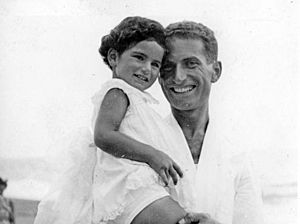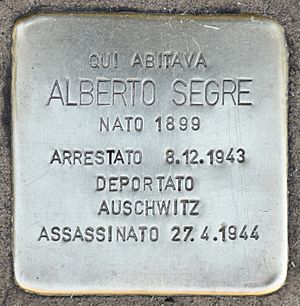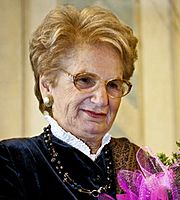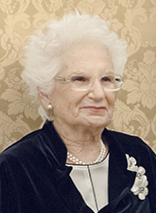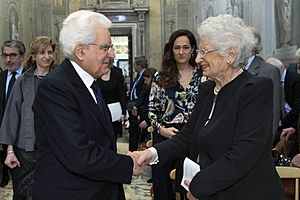Liliana Segre facts for kids
Quick facts for kids
Senator for life
Liliana Segre
|
|
|---|---|
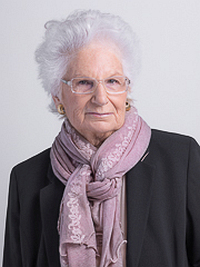
Segre in 2018
|
|
| Member of the Senate of the Republic | |
| Life tenure 19 January 2018 |
|
| Appointed by | Sergio Mattarella |
| Personal details | |
| Born | 10 September 1930 Milan, Kingdom of Italy |
| Political party | Independent |
| Spouse |
Alfredo Belli Paci
(m. 1951; d. 2007) |
| Children | 3 |
| Alma mater | Sapienza University of Rome University of Bergamo University of Trieste University of Verona LUMSA University |
| Known for | Holocaust survivor |
Liliana Segre (born 10 September 1930) is an Italian woman who survived the Holocaust. She was named a senator for life by the President of Italy, Sergio Mattarella, in 2018. This honor was given for her amazing contributions to society.
Born in Milan in 1930, Liliana came from a Jewish family. In 1938, she was forced to leave her school because of new laws against Jewish people in Italy. In 1943, she and her family were arrested. They were sent to the Auschwitz concentration camp, a terrible prison camp. Liliana was the only one in her family to survive. After World War II ended in 1945, she returned to Milan. For many years, she did not talk about her experiences. But in the 1990s, she began sharing her story, especially with young students.
Contents
Liliana Segre's Early Life
Liliana Segre was born in Milan, Italy. She lived with her father, Alberto, and her grandparents. Her mother passed away when Liliana was very young. Her family was not very religious. Liliana only truly understood she was Jewish when the Italian Racial Laws were put in place in 1938. These laws were unfair and led to her being kicked out of school.
As the persecution of Jewish people in Italy grew worse, Liliana's father tried to keep her safe. He hid her at a friend's house and used fake documents. On December 10, 1943, when she was 13, Liliana and her father tried to escape to Switzerland. However, the Swiss authorities did not let them in.
Arrest and Deportation
On December 11, 1943, Liliana and her father were arrested by fascists in Italy. They were held in prisons in Varese, Como, and Milan. After 40 days in prison, on January 30, 1944, Liliana was sent from Milan's Central railway station to the Auschwitz concentration camp. This journey took seven days.
When they arrived, Liliana was immediately separated from her father, Alberto. She never saw him again. He was killed on April 27, 1944. A few months later, on May 18, 1944, her grandparents were also arrested and sent to Auschwitz. They were killed upon arrival on June 30.
At Auschwitz, Liliana was given a number, 75190, which was tattooed on her arm. She was forced to work in a factory that made ammunition for about a year. During her time there, she faced three more "selections," where prisoners were chosen for death. In January 1945, as the camp was being emptied, she was forced to go on a "death march." This was a long, brutal walk to other camps, including Ravensbrück concentration camp in Germany. After weeks of terrible conditions, she was moved to another camp called Malchow. She was finally freed by the Red Army on May 1, 1945. Out of 776 Italian children aged 14 or younger sent to Auschwitz, only 35 survived.
Life After the Holocaust
After the Nazi Holocaust, Liliana moved to the Marche region of Italy. She lived with her maternal grandparents, who were the only other family members who survived. In 1948, she met Alfredo Belli Paci. He was a Catholic political prisoner who had also survived Nazi concentration camps. They married in 1951 and had three children.
Sharing Her Story
For a long time, Liliana Segre did not want to talk about her experiences in the concentration camps. Like many children who survived the Holocaust, it was very hard to return to a normal life. She also felt that no one wanted to listen to her story back then. In 1996, she remembered:
|
Era molto difficile per i miei parenti convivere con un animale ferito come ero io: una ragazzina reduce dall'inferno, dalla quale si pretendeva docilità e rassegnazione. Imparai ben presto a tenere per me i miei ricordi tragici e la mia profonda tristezza. Nessuno mi capiva, ero io che dovevo adeguarmi ad un mondo che voleva dimenticare gli eventi dolorosi appena passati, che voleva ricominciare, avido di divertimenti e spensieratezza. |
"It was very difficult for my relatives to live with a wounded animal like I was: A little girl who came back from hell, from whom obedience and resignation was demanded. Soon I learned to keep my tragic memories and deep sadness to myself. Nobody understood me, I was the one who had to adapt myself to a world that wanted to forget the painful events that had just past, that wanted to start again, eager for fun and carefree." |
It was not until the early 1990s that she decided to speak out. Since then, she has visited many schools and conferences. She tells young people her story. She does this for herself and for the millions of others who shared her experience but could never tell their own stories. In 1997, she was part of a documentary film called Memoria.
Liliana Segre has also been interviewed for books and videos. In 2004, she was interviewed for a book called Like a frog in winter. Conversations with three women who survived from Auschwitz. In 2005, her story was told in more detail in a book called Survived in Auschwitz: Liliana Segre among the last witnesses of the Shoah. She also gave a long video interview in 2005 for an online archive about forced labor.
In 2009, Liliana Segre lent her voice to a project called 'Tales of those who have survived'. This project collected stories from almost all Italian survivors of Nazi concentration camps who were still alive. In the same year, she appeared in a film-documentary called Binario 21 (Platform 21). This film was inspired by a poem about the murdered Jewish people.
Liliana Segre has received several honorary degrees from universities. These degrees recognize her important work and testimony. She received degrees from the University of Trieste (2008), the University of Verona (2010), and LUMSA University (2020).
Senator for Life
On January 19, 2018, Liliana Segre was appointed a senator for life by the President of Italy, Sergio Mattarella. This happened on the 80th anniversary of the Italian Racial Laws. She was chosen for her outstanding contributions to society.
Liliana Segre is the fourth woman to become a senator for life in Italy. Her first idea as a senator was to create a special committee. This committee would work to fight racism, antisemitism (hatred against Jewish people), and hate speech. Other senators for life supported her idea. On October 30, 2019, the Senate of Italy voted to approve this committee.
Because she received many threats online, Liliana Segre was given a bodyguard in Milan on November 7, 2019.
On January 29, 2020, she spoke at the European Parliament. This was for International Holocaust Remembrance Day and the 75th anniversary of the liberation of Auschwitz. Everyone there gave her a standing ovation.
On February 18, 2020, she received an honorary PhD in European history from Sapienza University of Rome. She dedicated this award to her father, Alberto, who was "killed for the guilt of being born (Jewish)."
On October 9, 2020, after 30 years of sharing her story publicly, she gave her last public speech. She spoke to young people in Rondine, Italy. She told them not to blame others for their own problems. She reminded them that they are very strong. Thousands of students across Italy watched her speech online.
On February 2, 2021, the University of Pisa gave Liliana Segre an honorary degree in peace and conflict studies.
Before the 2022 Italian general election, Liliana Segre suggested that Giorgia Meloni, the leader of the Brothers of Italy party, should remove a symbol from her party's logo. This symbol, the "tricolour flame," is seen by some as a sign of neo-fascism. The Democratic Party supported Segre's view. However, the Brothers of Italy party kept the symbol. On October 13, 2022, Liliana Segre led the Senate session where Ignazio La Russa was announced as the new President of the Senate.
See also
 In Spanish: Liliana Segre para niños
In Spanish: Liliana Segre para niños
- Children in the Holocaust
- List of Holocaust survivors
 | William Lucy |
 | Charles Hayes |
 | Cleveland Robinson |


